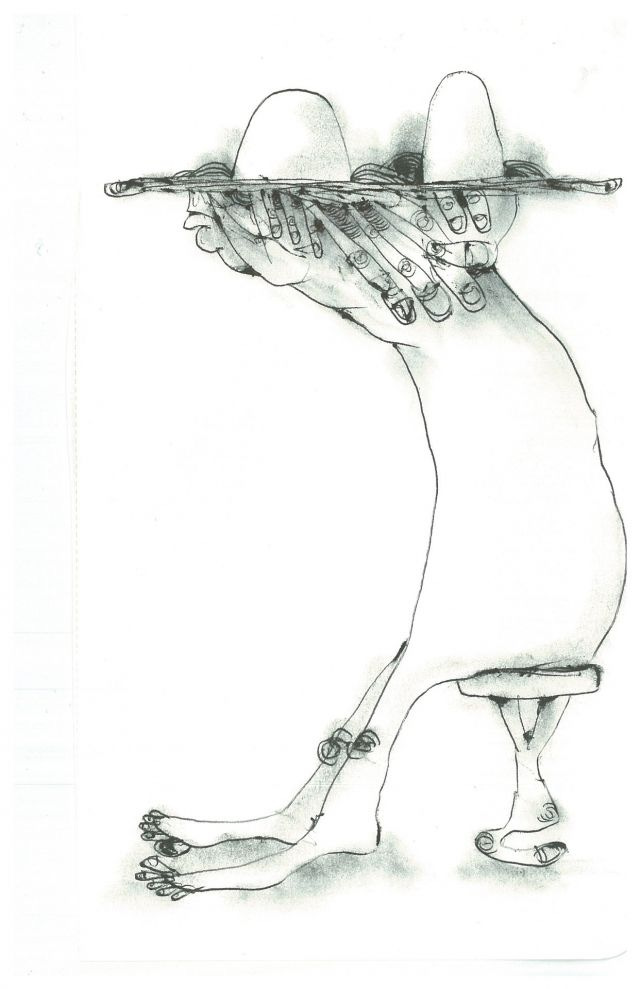Ancient Astronaut "Theory"
Maddd Science

On why ancient astronaut theory is explicitly racist. Turns out 70s-era sci-fi played a big part in why we've suffered through 13 seasons of Ancient Aliens on the "History" channel.
Technology Worship and Human Debasement in Erich von Däniken’s ‘Chariots of the Gods?’
K.E. Roberts, We Are The Mutants
At heart, he believes that human beings have no heart, no spark, no native creative agency: we are purely bio-technological vessels, a collection of frozen Tin Men awaiting our interstellar Dorothies to impart the breath of life, to inject the evolution-hopping elixir into our adolescent circuitry. It’s just that the whiter skinned among us are better learners.
Here's an interesting tweet that 70s sci-fi artist David A. Hardy just tagged me in today that covers similar ground, as well as being an inside look at how 1972-era sci-fi and fantasy magazine covers are made.
Speaking of cryptozoology, the 60s-70s saw the rise of Bigfoot sci-fi, which was a pretty weird subgenre:
Paperbacks from Hell #20: Bigfeets!
Grady Hendrix, email newsletter
In short order, Bigfoot became a staple of non-fiction Fortean paperbacks, but it wasn't until February, 1976 that Bigfoot fiction began to appear in the wake of The Six Million Dollar Man two-parter, “The Secret of Bigfoot,” in which Steve Austin de-armed Sasquatch (played by Andre the Giant) discovering that the beast was a bionic watchdog for some local aliens. Berkley published the novelization of the Six Million Dollars Man episode, The Six Million Dollar Man and the Secret of Bigfoot, in 1976, and after that a veritable herd of bigfoot fiction stampeded across bookstore racks.
I'm keeping the cryptid theme going with an article with an intro that name-drops unicorns. It's a loose theme, okay?
‘The Bold Type’ Has Some of the Best Media Criticism on TV
Alison Herman, The Ringer
At an important meeting, social media director Kat (Aisha Dee) gives a presentation to a group many years her senior and several levels above her on the org chart. They may have more power than she does, but she knows something they don’t: Which story will get more online traction—a standard gossip item about Prince Harry and Meghan Markle or a piece about a man who self-identifies as a unicorn? Her audience says Prince Harry, but she proves it’s the unicorn. “When it comes to the internet and millennials, it’s not about the story,” she explains. “It’s about the conversation it starts.”
Vampires are cyptids, too, right?
'Preacher's' vampire lead is the perfect send-up of TV's Vampire Moment
Alexis Nedd, Mashable
It’s Cassidy’s cultivated grossness that makes him the ultimate bookend to TV vampires. Pop culture would have the world believe that being alive for 100+ years makes people live like men out of time, with old-school politeness and a fantastic wardrobe, but Preacher calls bullshit on that trope. Cassidy is a train wreck who will never find a therapist old enough to help him! FOH with that genteel Bill Compton nonsense; murder-based immortality should feel like a drunk, sad party.
Gillian Flynn Isn’t Going to Write the Kind of Women You Want
Megan Abbott and Gillian Flynn, Vanity Fair
"In 2005, to write about women and violence, and women and sexuality, and women and rage, I knew I’d have to disguise it in a mystery. Otherwise, no one would read it. And here we are, 13 years later, and that’s still the case."
The Luke Cage Syllabus: A Breakdown of All the Black Literature Featured in Season Two of the Netflix Hit
Tara Betts, Black Nerd Problems
Although Columbia University Jelani Cobb is one of the talking heads debating Luke Cage’s moves on television in Pop’s Barbershop, he is an author as well. The Substance of Hope: Barack Obama and The Paradox of Progress is his latest book. The Devil and Dave Chapelle: & Other Essays and To the Break of Dawn: A Freestyle on the Hip Hop Aesthetic are his earlier works. Based on his subjects, it’s easy to see how Cobb fits into the flow of some of the show’s themes.
Science Fiction And Fantasy Book Sales Have Doubled Since 2010
Me, Forbes
The data-cruncher behind Author Earnings believes nontraditionally published authors have slipped under the radar, massively skewing the public's understanding of the SF&F market.
Since 2010, unit sales of self-published and Amazon-published ebooks have grown, and in 2017, they constitute a full 48% of all SF&F sales across print, digital, and audio.
Next Week on Maddd Science: Westworld. (kinda surprising a 70s sci-fi fan in 2018 took this long to get around to Westworld, really)
My Patreon remains in: existence